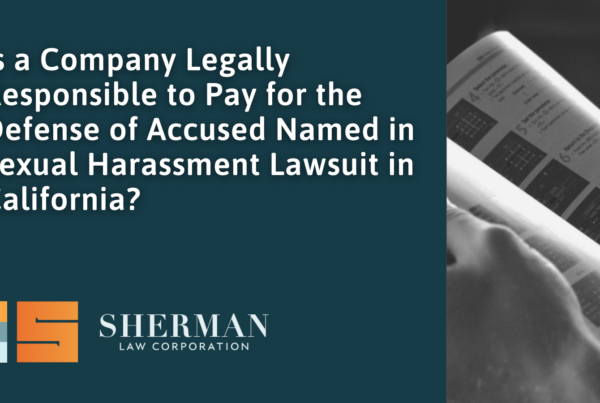
Dismissal of Wrongful Termination and Class Action Lawsuits against Employers, No Money Paid
Having just celebrated the Company’s tenth anniversary, the President of a small California-based Company lamented with disbelief as to how the Company he built with sweat and tears from the ground up had left him to the mercy of the overburdened California court system, employee-friendly laws, with no immediate recourse.
The Company Faced Not One, But Two, Employment-Related Lawsuits
Unfortunately, the Company was defending not one, but two separate lawsuits filed in Los Angeles Superior Court, without even as much as a demand letter before he was served. The first lawsuit was a ten cause of action “kitchen-sink” wrongful termination complaint by a former employee of the Company (not the independent contractor who he previously worked). A few weeks later, the Company was hit with a second lawsuit, a wage and hour class action complaint claiming that the Company’s employees were misclassified as salaried exempt employees, such that they were owed overtime, meal and rest break premiums, and all the other wage and hour violations that follow. The former employee was represented in both lawsuits by the same law firm, whose website “abemploymentlawyers.com” held themselves out as experienced employment lawyers.
Sherman’s Strategic Aggressive Offensive Resulted in the Dismissal of Both Lawsuits, with No Money Paid by the Company, in Less than Four Months.
Lisa Sherman launched an aggressive offensive, that included, conducting a detailed factual and legal investigation, serving written discovery, filing a cross-complaint, and was on the heels of filing several motions.
Defending the class action lawsuit on the basis that the Company’s salaried employees were exempt from overtime is always challenging in California. The actual duties of the employees dictate the outcome. After interviewing and shadowing the employees, Lisa Sherman was able to confirm that the Company’s salaried employees spent more than fifty percent of their time independently making important decisions to serve their high-powered clients whose demands were anything but routine. Picture the scene from The Devil Wears Prada, when the Editor-in-Chief of Runway Fashion Magazine, played by Meryl Streep, who is depicted as icy, threatening and condescending to her staff, demands from her new second assistant, played by Anne Hathaway, deliver the next Harry Potter manuscript so that Meryl’s dysfunctional children can read it before anyone else does. Short of stalking J.K. Rollins at her house in England, Anne’s character panics because the book was still unpublished. It ends with some hot entertainment executive saving the day as she barely delivers the manuscript to the icy princess. California case law upheld the exempt status of employees whose functions required significant discretion.
In the wrongful termination case, in response to written discovery requests, the former employee categorically denied, under penalty of perjury, that he was ever insubordinate; that he ever performed poorly; that he was ever counseled; that he ever removed any Company property, or that, following his termination, he continued to contact and “service” Company clients, all of which was indisputably refuted by documents he authored and produced.
Ms. Sherman prepared a motion to disqualify the former employee and his counsel on the class action for an obvious conflict of interest because- counsel cannot represent a former employee in his own wrongful termination lawsuit while at the same time representing the interests of a purported class; a motion seeking the Company’s attorneys’ fees as sanctions against the former employee and his counsel, jointly and severally, for pursuing both lawsuits without legal or factual support. In support of the motions were in excess of two dozen declarations (statements signed under penalty of perjury) explicitly refuting the substance of each and every allegation asserted in both lawsuits, including, detailed signed job descriptions supporting the exempt status.
In less than four months’ time, before any of these motions were filed, without having taken a single deposition, counsel for the former employee agreed to voluntarily dismiss both lawsuits, sign a full release of claims against the Company, with absolutely no money paid by the Company to the former employee or his counsel.
The Significance of This Result:
While Lisa Sherman has successfully obtained dismissals before, almost every single time, any “voluntary” dismissal by the employee often times still included a nuisance value payment to the employee and his/her counsel although employers take solace in the fact that the opposing party made little to no money on the case, and often, times even takes a loss. In litigation, involuntary dismissals are either granted by courts on dispositive motions or following trial, but they do not become final until all appeal rights are exhausted. In almost all cases where the trial court has dismissed the case, issued a significant adverse ruling such as striking punitive damages, and/or ordered attorneys’ fees and/or costs to the employer, an appeal will follow, delaying recovery for years, and costing the employer more time and expense in the appeals process. To the extent that a judgment is only against the employee, the judgment is often times not worth more than the paper it is written on; employers rarely collect. In the vast majority of these cases, the dismissal, key ruling, sanctions and/or attorneys’ fee awards are used to negotiate a final resolution of the case.
What makes this result remarkable is that counsel, after reassessing the undisputed factual and legal basis of their client’s two lawsuits, cut their losses early, not waiting until the employer spent months and months filing costly motions to reach the same result. Unfortunately, this is not a regular occurrence because the employees’ counsel has spent some money and time in the lawsuits and expects to recover at least what they put into it, not to mention an additional premium on the fees the employer would be required to spend if they are required to reach the same result through costly motions.
The owner of the company was interviewed about this case.
For more information on wrongful termination cases, feel free to call Lisa Sherman at (323) 488-2087 or email lisa@sherm-law.com.
| Related Links:
Statute of Limitations For California Employment-Related Claims? |




